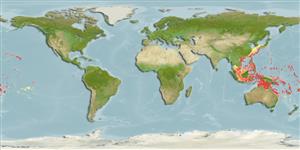>
Eupercaria/misc (Various families in series Eupercaria) >
Labridae (Wrasses) > Bodianinae
Etymology: Bodianus: Bodianus after Bodiano or Pudiano, from the Portuguese pudor, meaning modesty (Jordan & Evermann, 1896); loxozonus: Name from Greek loxos for slanting, and feminine noun zone or belt, referring to the prominent black oblique band posteriorly on the body of adults of this species (Ref. 75973).
More on author: Snyder.
Environment: milieu / climate zone / depth range / distribution range
Ecologia
marinhas associadas(os) a recifes; intervalo de profundidade 3 - 100 m (Ref. 9823), usually 3 - 40 m (Ref. 27115). Tropical; 25°C - 28°C (Ref. 27115); 37°N - 35°S, 101°E - 130°W
Western Pacific: eastward to French Polynesia, north to Japan, south to New Caledonia. Myers & Lieske 1994 (Ref. 9710) list the subspecies loxozonus as occurring from Vietnam to the Marshall Islands and Tonga, north to the Ryukyu and Ogasawara Islands and the subspecies trotteri as occurring in the Line and Cook Islands and French Polynesia. Reports of Bodianus hirsutus (synonym of Bodianus macrourus) from SW Indian Ocean may be referring to this species.
Tamanho / Peso / Idade
Maturity: Lm ? range ? - ? cm
Max length : 47.0 cm TL macho/indeterminado; (Ref. 9710)
Espinhos dorsais (total) : 12; Raios dorsais moles (total) : 9 - 11; Espinhos anais: 3; Raios anais moles: 11 - 12. Adults usually with a large black blotch on the back, extending along the lower lobe of the tail fin to the black ventral fins, but reduced to a small patch in large males (Ref. 48636). Often misidentified as Bodianus hirsutus (synonym of Bodianus macrourus (Lacepede, 1801) (Ref. 54980).
Adults inhabit clear lagoon and seaward reefs (Ref. 1602), on slopes or along upper part of drop-offs (Ref. 48636). Feed mainly on benthic, hard-shelled, invertebrates such as mollusks and crustaceans (Ref. 9823). Oviparous, distinct pairing during breeding (Ref. 205).
Life cycle and mating behavior
Maturidade | Reprodução | Desova | Ovos | Fecundidade | Larvas
Oviparous, distinct pairing during breeding (Ref. 205).
Gomon, M.F., 2006. A revision of the labrid fish genus Bodianus with descriptions of eight new species. Rec. Aust. Mus. Suppl. 30:1-133. (Ref. 75973)
Categoria na Lista Vermelha da IUCN (Ref. 130435: Version 2024-1)
Ameaça para o homem
Harmless
Utilização humana
Pescarias: pouco comercial; Aquário: Espécies comerciais
Ferramentas
Relatórios especiais
Descarregue XML
Fontes da internet
Estimates based on models
Preferred temperature (Ref.
123201): 24.6 - 28.8, mean 27.6 °C (based on 668 cells).
Phylogenetic diversity index (Ref.
82804): PD
50 = 0.5000 [Uniqueness, from 0.5 = low to 2.0 = high].
Bayesian length-weight: a=0.01230 (0.00569 - 0.02662), b=3.05 (2.87 - 3.23), in cm total length, based on LWR estimates for this Genus-body shape (Ref.
93245).
Nível Trófico (Ref.
69278): 3.6 ±0.50 se; based on food items.
Resiliência (Ref.
120179): Médio, tempo mínimo de duplicação da população 1,4 - 4,4 anos (Preliminary K or Fecundity.).
Fishing Vulnerability (Ref.
59153): Moderate vulnerability (37 of 100).
Nutrients (Ref.
124155): Calcium = 37.3 [22.8, 58.4] mg/100g; Iron = 0.524 [0.314, 0.921] mg/100g; Protein = 18.6 [15.7, 20.8] %; Omega3 = 0.145 [0.100, 0.211] g/100g; Selenium = 37.8 [23.9, 61.9] μg/100g; VitaminA = 92.5 [30.2, 316.1] μg/100g; Zinc = 1.2 [0.9, 1.8] mg/100g (wet weight);
